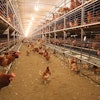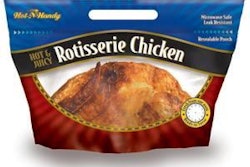
The battle over what constitutes “natural” meat and poultry got under way in October 2006 when Hormel petitioned USDA for a rule to codify the definition of “natural.” USDA promptly issued a Federal Register Notice and convened a public meeting in December of that year to solicit public comments. No action yet – USDA just published an Advance Notice of Proposed Rulemaking (ANPR) to solicit further comments, which are due by November 13.
Issues raised in the ANPR include:
Is rulemaking needed? – Views are split with some agreeing with the Hormel petition that rulemaking is needed to clarify and codify requirements for the use of “natural” claims. Others object to rulemaking, saying that FSIS should maintain a flexible policy on the use of “natural” claims instead.
Sara Lee, for example, has petitioned that FSIS continue case-by-case consideration begun in 2005. Along with others, they argue that a codified definition of “natural” is unnecessary and would restrict FSIS’s ability to update its “natural” claims policy to address new technologies and changes in consumer expectations.
Major issues for poultry
‘Enhanced’ products – FSIS received over 12,000 electronic form letters from individuals stating that they are members of the Truth in Labeling Coalition expressing the view that poultry products containing added solutions (i.e., “enhanced” poultry) should not be labeled as “natural.” They said “natural” products are not injected with solutions containing water, salt, flavorings, seasonings, tenderizing agents, and water-binding ingredients, such as the seaweed extract carrageenan.
Some have suggested that raw, single-ingredient poultry products that are not otherwise marinated, seasoned, injected, or otherwise “enhanced” could be labeled as “natural,” while raw poultry products that have been enhanced with “natural” ingredients could bear claims such as “Made with All Natural Ingredients” or “Enhanced with All Natural Ingredients.”
“Natural” and animal production conditions – Should “natural” claims on labels reflect the conditions under which animals used to produce the products were raised? Most of these comments stated that meat and poultry products from animals that have been genetically altered, treated with hormones, or fed prophylactic antibiotics should not qualify to be labeled as “natural.” The comments also asserted that products from animals raised under intensive confinements that were unable to engage in their natural behavior should not be labeled as “natural.”
Should ‘multifunctional’ ingredients be allowed as ‘natural’? – Sodium lactate, as well as potassium lactate and calcium lactate, may provide antimicrobial effects at levels approved for their flavoring effect. Additional multi-functional ingredients, such as sodium citrate, distilled vinegar, fruit juice concentrates, and sea salt, may present similar issues for the Agency's “natural” policy.
Natural products versus natural ingredients – Should separate criteria be established for natural products and products with natural ingredients?
Non-traditional food processing methods – Many processing methods in use today did not exist 25 years ago when FSIS first established its policy on “natural.” These include steam pasteurization, ultra pasteurization, modified atmosphere packaging, and high pressure processing. Should FSIS consider a meat or poultry product to be “minimally processed” – and natural – based on the processing method’s impact on the food rather than the complexity of the processing technology and equipment?
Carbon monoxide – Should the use of carbon monoxide be allowed in products labeled “natural”? Although carbon monoxide is Generally Recognized as Safe (GRAS) and suitable substance in modified packaging systems, FSIS considers the use of this technology as inconsistent with its policy on “natural.”


















